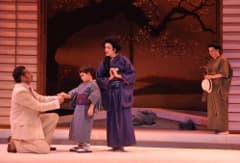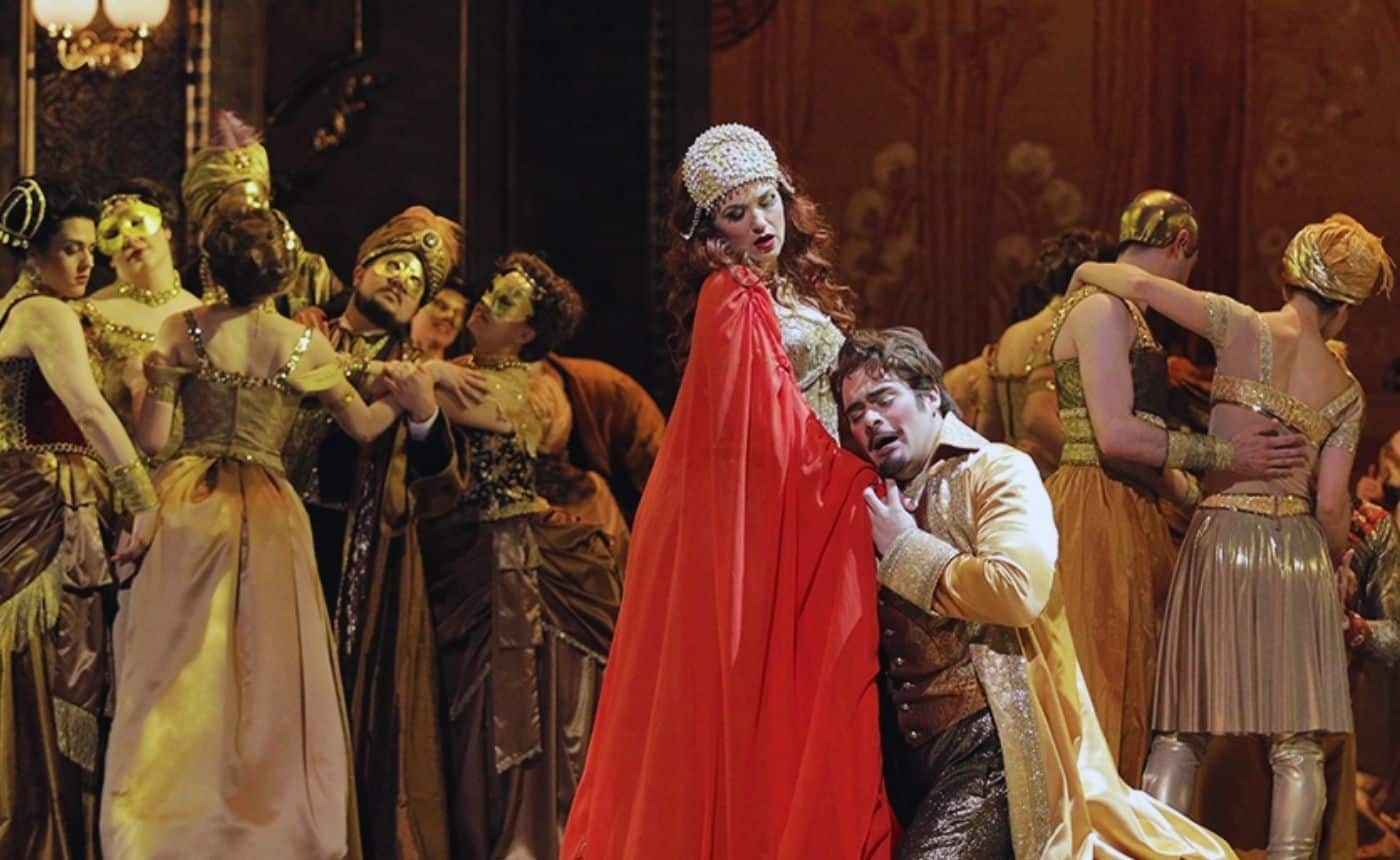The Making of Madame Butterfly – Part Two. The Play.
Part Two. The Play.

“…dramatization…of a character and a situation…” Indeed! Belasco’s one-act play is set in “Butterfly’s little house at the foot of Higashi Hill.” That’s a change: Long (based on Loti’s story?) tells us that it was a “steep” climb to the house. The direction notes that the room is completely Japanese except for the “American locks and bolts on the doors and windows and an American flag fastened to a tobacco jar.” As the curtain rises, Butterfly is making an offering to a traditional shrine, praying that “Lef-ten-ant B. F. Pik-ker-ton may come back soon.” Gone is Long’s introduction to the American ship arriving in Nagasaki; gone is his bald statement that Pinkerton procured a bride (and a house) as was allowed between a native girl and a foreign sailor; gone is Pinkerton’s insulting of her relations. In fact, gone is Pinkerton!
Cho-Cho-San summons her maid and asks her how much money is left. Suzuki’s counting in Japanese monetary terms provokes an outburst from her mistress: “…how many times I tellin’ you – no one shall speak anythin’ but those Unite’ State’ languages…That’s one thin’ aeverbody got recomlec’ account it’s ‘Merican house – his wife, his maid.” The twenty-first-century reader must be horrified by the pseudo-pidgin-English of Butterfly, which sounds like a 1930’s Hollywood script-writer’s version of what was then accepted as African-American speech – think “Mammy” in Gone With The Wind.
Belasco’ s Suzuki gives us information that Long did not: Pinkerton has been gone for two years. She is concerned about what will happen to them if he doesn’t return, but Butterfly, convinced he will, makes light of her worries. The opera-lover knows we’re in Puccini’s Act 2.
Sharpless, the American Consul, arrives, ushered in by the “Nakodo” (the marriage-broker, who loses the name Long gave him: Goro.) This corresponds, in Long’s story, to Cho-Cho-San’s visit to the Consul to ask him when American robins nest. Tea is served and the Nakodo defends himself against Butterfly’s accusation of trying to marry her off to Yamadori by noting “Madame Cho-Cho-San is very poor.” The Consul’s inquiry about her family Butterfly considers “foanny.” “My people make me marry when I don’ want; now I am marry, they don’ want.” She has been “outcasted.”
Butterfly then talks of her father’s suicide, and produces his sword on which is etched To die with honor, when one can no longer live with honor. She tells the Consul that the “ol’ Nakodo” knew of someone who wanted a “nice wive for three monse.” The Nakodo didn’t like the American, but Butterfly’s family encouraged her: “Yaes, take him – take him beas’ – he’s got moaneys.” At the (traditional) “For look-at meeting” Butterfly thinks the American sailor “is jus’ a god!” She melts when he kisses her: “Japanese girl no lig’ kizz; but when Lef-ten-ant B. F. Pik-ker-ton kizz me, I like ver’ much.” In Butterfly’s telling no sooner were they married than Pinkerton’s ship was ordered to sail. “I am jus’ waitin’ – sometimes cryin’, sometimes watchin’, but always waitin’.”
Yamadori arrives and greets the Consul: “…always a pleasure to meet you here or in New York.” He explains that he’s back in Japan for a two-month pleasure trip. Butterfly’s scornful comment that whenever he returns to Japan he gets another woman, leads to a discussion about the difference between American and Japanese divorces. Yamadori comments that in Japan desertion equals divorce. Butterfly clings to her notion of the American way of divorce: a long and involved process of judicial hearings and decisions. In an aside Sharpless tells Yamadori that Pinkerton’s ship is overdue and that his American wife is already in Nagasaki. Yamadori leaves.
Sharpless, in a “solemn manner…takes a letter from his pocket.” It’s from Pinkerton. Despite Butterfly’s interruptions, he reads. And the tone of the letter is as condescending as Long depicted him. “Find out about that little Jap girl…It might be awkward now…Let her down gently…for two weeks after I sailed I was dotty in love with her.” She, of course, is ecstatic at the mention of love, but also fearful that Pinkerton might desert America.
The Consul asks her what she might do if waiting for Pinkerton proved unending: “I could dance, mebby, or – die?” He suggests, given her situation, that she should accept Yamadori’s offer of marriage. She summons Suzuki to show out “the excellent gentleman.” It dawns on Butterfly that her marriage to Pinkerton means nothing: “I not Lef-ten-ant B. F. Pikkerton’s wive – Me?” “Hardly,” the Consul replies.

Wails are heard from an off-stage Suzuki. Apparently the Nakodo has told people, based (he claims) on Yamadori’s American experiences, that illegitimate children in America are placed in homes and “never rise above the stigma of their class. They are shunned and cursed from birth.” Butterfly is outraged. At the height of her anger a “ship’s gun” is heard. And again. Cho-Cho-San looks through the telescope and eventually discerns the ship’s name: “Con-nec-ti-cut.” Pinkerton’s ship has returned.
Now the house must be prepared. “Hoarry, Suzuki, his room…His cigarettes…His slipper…His chair…His bed.” And Butterfly, with Suzuki’s help, must make herself as beautiful as she was when she first met Pinkerton, though perhaps she “change since he went away – not so beauty?…make me pretty…you moas’.” Suzuki prepares Butterfly who, in turn, prepares the child. That done, she makes holes for each of them in the shoji, and their wait begins. The stage-direction is simple; During the vigil, the night comes on. SUZUKI lights the floor lamps, the stars come out, the dawn breaks, the floor lights flicker out one by one, the birds begin to sing, and the day discovers SUZUKI and the baby fast asleep on the floor; but MADAME BUTTERFLY is awake, still watching, her face white and strained.

But I get ahead of myself!
The electrical lights having worked their magic on Puccini, Butterfly, the next morning, orders Suzuki to bring fresh flowers; she, and the baby, will watch for Pinkerton “from liddle look out place”, and orders a “mos’ bes’ nize breakfas’ ready w’en he come.”
From off-stage we hear Butterfly sing (“that she may not weep”) the song Pinkerton sang to her. Long’s story provides the lyrics, which sound like a mis-remembered version of “The Jewel of Asia”, one of the “hit” songs from The Geisha, which opened in London in 1896, ran for over 750 performances, and went on to become a huge international success. We also hear her sing a song Pinkerton sang to her: Rog-a-bye, bebby,/Off in Japan/ You jus’ a picture,/Off of a fan.
A knock on the door. “Madame Butterfly?” The question is repeated and Lieutenant Pinkerton finally appears, followed by Sharpless. John Luther Long’s story begins with Pinkerton, but Belasco’s adaptation keeps him off-stage until now. Pinkerton recognizes that the house is the same as when he left. He admits he was tempted to return before his ship sailed, two years ago, but figured Butterfly would be “ringing your gold pieces to make sure they’re good.” Which is what Loti had heard when he returned to the house he shared with Madame Chrysanthème.
The Nakodo lurks. Why did he approach Pinkerton’s wife to tell her about Butterfly’s child? He figured that, if there were to be trouble between the women, Pinkerton would side with his American wife, Butterfly would marry Yamadori, and the Nakodo would collect a “big fee.” The Nakodo exits.
The mention of a “fee” reminds Pinkerton of the “one thing I can do – money.” And he gives Sharpless an envelope “containing some money.” Sharpless wonders what was the reaction of Pinkerton’s wife to the news that her husband already was a father. “…it was rather rough on her – only married four months…my Kate’s an angel, – she offered to take the child…made me promise I’d speak of it to Butterfly.” Long’s “Adelaide” has become Belasco’s “Kate”; and we are spared Long’s embarrassing, but necessary, scene in the Consulate in which Butterfly overhears Adelaide’s dictated message to her husband.
Butterfly enters with the baby, calling for Suzuki. Pinkerton retreats behind a screen and, in an aside to Sharpless: “I can’t face it! I’ m going. Give her the money.” Suzuki sees him slink off, and exits with the baby in her arms. The Consul gives Butterfly the envelope: “That is in remembrance of the past. He wishes you to be always happy, to have the best of luck; he hopes to see you soon – and – (the lie dies out on his lips.)” Butterfly understands.
In rushes Kate. “Has Lieutenant Pinkerton gone?” Ignoring Sharpless’s warning, Kate plunges, tactlessly, ahead. “Why, you poor little thing…who in the world could blame you or…call you responsible…you pretty little plaything.” Four months married, as opposed to Butterfly’s two years? Don’t touch the child! “…let me take him home to my country…I will do all I would for my own.” Butterfly bemoans that her son would not know his own mother -“but would it not be better?”
Butterfly gives Kate the two dollars she has managed to save from Pinkerton’s original donation, together with the envelope of cash Sharpless gave her: “…I shall need no more…I lig if you also say I sawry – no – no – no – glad – glad! I wish for him that same happiness lig he wish for me…an’ tell him…I shall be happy…mebby…Goon-night.” Kate may be crying, but she demands the child. “Come back fifteen minute…Sayonara.”
“Don’ cry, Suzuki,…accoun’ I dizappoint…(Wearily) …go way an’ I will res’ now…long sleep…an’ when you see me again, I pray you look whether I be not beautiful again…as a bride.”
Suzuki, knowing what is about to happen, reluctantly leaves the room in tears. Butterfly locks the door, lights incense before the shrine, takes down her father’s sword and reads the inscription: To die with honor…when one can no longer live with honor.

And then follows the stage direction that will epitomize Pinkerton’s American marriage: KATE enters quickly urging the reluctant PINKERTON to follow her.
Belasco implies that Pinkerton, realizing what Cho-Cho-San has done, finally acknowledges, with his last line, some guilt in this tragedy; though “Oh! Cho-Cho-San!” seems a remarkably tame reaction to his Japanese wife’s suicide! Butterfly’s dying words should, and, we hope, will, resonate with him: Too bad those robbins didn’ nes’ again.





